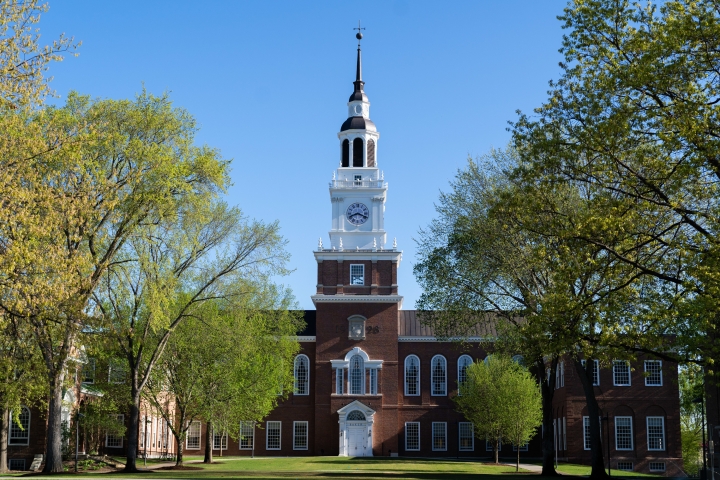This fall, the Provost’s Fellowship Program will host the largest group of doctoral and postdoctoral students in its history, while also adding more disciplines across Dartmouth.
A multidisciplinary cohort of emerging scholars who share a commitment to increasing diversity and inclusivity in their disciplines, fellows in the PROF Program take part in mentoring and professional development programming and design and teach original undergraduate courses.
Since 1991, the three core fellowships that make up the program have brought nearly 100 early-career scholars to campus, with 85% of them going on to serve as faculty at colleges and universities.
Just this month, two alumni of the program were appointed to prestigious faculty positions: Evie Shockley was appointed to the Zora Neale Hurston Chair and Distinguished Professor of English at Rutgers University, and Anne Charity Hudley was named the associate dean of educational affairs at the Stanford Graduate School of Education.
“The Provost’s Fellowship Program is one of Dartmouth’s most important contributions to expanding and diversifying the professoriate,” says Associate Provost for Faculty Affairs Dean Lacy. “Universities across the country look to our program as a model for launching academic careers.”
“The fact that our outgoing fellows continue to find tenure-track positions in a tight job market says a lot about how the PROF Program helps prepare them for the next stage of their careers,” adds Associate Professor of Spanish and Portuguese Israel Reyes, who has served as faculty director of the program since 2017.
Bringing Myriad Disciplines Together
Most of the fellowships within the PROF program began at Dartmouth in the early 1990s: the Thurgood Marshall Fellowship in African American and African Diasporic Studies, the Charles Eastman Fellowship in Native American and Indigenous Studies, and the César Chávez Fellowship in Latinx Studies.
Dartmouth’s 2016 Inclusive Excellence initiative expanded this suite of fellowships by increasing their length, adding Asian American studies, and establishing additional positions that rotate among departments.
“When we studied the impact of these fellowships a few years ago, it was remarkable to learn how many prominent scholars started their careers with a Dartmouth dissertation fellowship,” says Professor of Comparative Literature Michelle Warren, who led an assessment funded by the Mellon Foundation in 2015 and currently serves as senior advisor for faculty development, diversity, and inclusion for the Faculty of Arts & Sciences.
Since 2019, when the Guarini Dean’s Postdoctoral Fellowship launched, topic areas have included earth sciences; ethnicity, race, and migration in the U.S. context; Afro-Latinx and/or Afro-Latin American studies; and strategy and management in the Tuck School of Business. Each year, departments, programs, and schools have the opportunity to propose fellowships in a process jointly organized by Lacy and Guarini School for Graduate and Advanced Studies Dean Jon Kull ’88.
“It’s been especially valuable to be part of the Department of Native American and Indigenous Studies while also having the opportunity to connect with colleagues in other ethnic studies,” says Sunaina Keonaona Kale, an ethnomusicologist and Charles Eastman Fellow in Native American and Indigenous Studies. “This interdisciplinary community opens me up to different kinds of feedback and enhances my thinking.”
“One of the benefits of being part of a cohort of young scholars from different areas is that speaking with each other about our research helps us make our work more accessible across disciplines,” adds Vanessa Castañeda, the Guarini Dean’s Postdoctoral Fellow in Afro-Latinx and/or Afro-Latin American Studies. “It’s a really wonderful community to grow in.”
This fall, for the first time, a fellow will join the PROF cohort through the Guarini Dean’s Postdoctoral Fellowship at the Dartmouth Institute for Health Policy and Clinical Practice at the Geisel School of Medicine. The two-year residential fellowship supports a scholar whose research addresses health equity.
A New Cohort of Emerging Scholars
The new cohort of fellows will arrive on campus in August, and PROF workshops and activities will kick off the first week of the fall semester. Fellows completing dissertations will work closely with a writing coach and take part in works-in-progress presentations and a writing retreat. For fellows on the job market, the program offers mock job talks, workshops on application materials, and other professional development resources.
During the first year, fellows have the opportunity to focus on their research and writing. “I’ve been so grateful to have the time to prioritize research and writing,” says Castañeda. “I love teaching, but as an emerging scholar it’s really important to publish.”
The fellows also teach one undergraduate course in their second year, a course they design based on their own scholarship. The program provides course development workshops that assist fellows in customizing courses for Dartmouth’s 10-week term.
“It helps to have a cohort of fellows who are at similar stages in their careers so that they can support one another,” says Reyes. “It’s a great way to foster mutual mentoring relationships that we know continue long after our fellows’ experience at Dartmouth.”
The following fellows will join the Dartmouth community in August:
- Katherine Achacoso (Asian American studies) from the University of Hawai’i
- Yuki Atsusaka (government) from Rice University
- Benjamin Carter (The Dartmouth Institute) from Stony Brook University
- Amanda d’Urso (government and quantitative social science) from Northwestern University
- Naiima Khahaifa (geography and African and African American studies) from the State University of New York at Buffalo
- Danielle Lucero (Native American and Indigenous studies) from Arizona State University
- Gisselle Mejia (environmental studies) from the City University of New York
- Shelby Sinclair (African and African American studies) from Princeton University.
